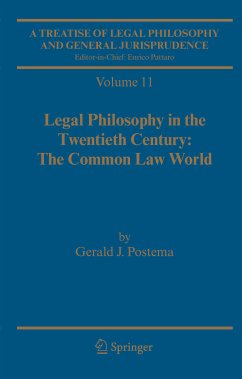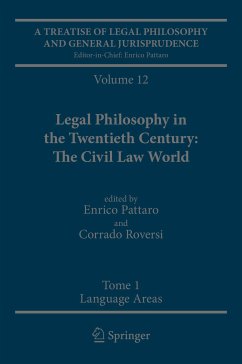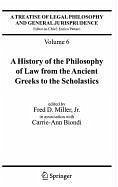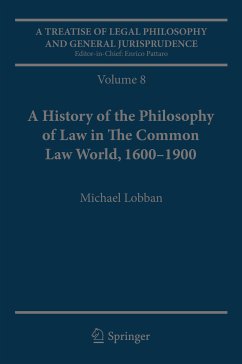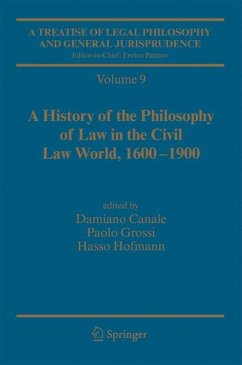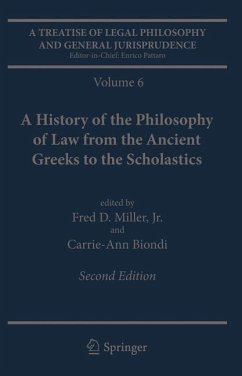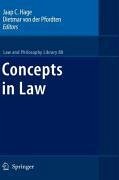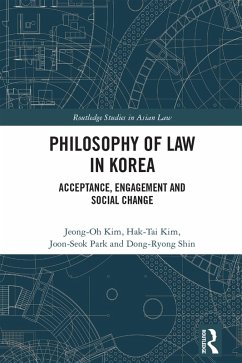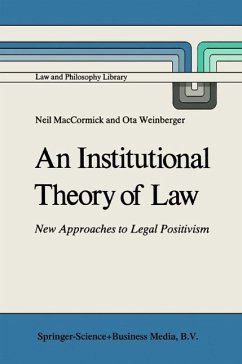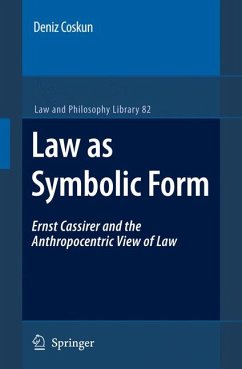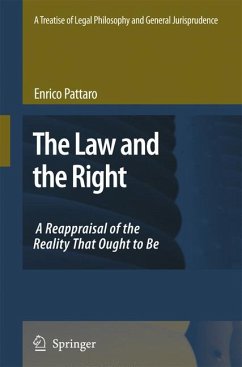
A Treatise of Legal Philosophy and General Jurisprudence (eBook, PDF)
Volume 1:The Law and The Right, Volume 2: Foundations of Law, Volume 3: Legal Institutions and the Sources of Law, Volume 4: Scienta Juris, Legal Doctrine as Knowledge of Law and as a Source of Law, Volume 5: Legal Reasoning, A Cognitive Approach to the Law
Versandkostenfrei!
Sofort per Download lieferbar
512,95 €
inkl. MwSt.
Weitere Ausgaben:

PAYBACK Punkte
256 °P sammeln!
The Treatise of Legal Philosophy and General Jurisprudence is a comprehensive treatment of the issues in legal philosophy and general jurisprudence. This major reference work will consist of a Theoretical Part, 5 volumes, to be published in 2005, and a Historical Part, 6 volumes, scheduled to be published by the end of 2006.The work is aimed at jurists and at legal and practical philosophers. The theoretical part covers the main topics of contemporary debate. The historical volumes account for the development of legal thought from ancient Greek times through the twentieth century.Volume 1: The...
The Treatise of Legal Philosophy and General Jurisprudence is a comprehensive treatment of the issues in legal philosophy and general jurisprudence. This major reference work will consist of a Theoretical Part, 5 volumes, to be published in 2005, and a Historical Part, 6 volumes, scheduled to be published by the end of 2006.
The work is aimed at jurists and at legal and practical philosophers. The theoretical part covers the main topics of contemporary debate. The historical volumes account for the development of legal thought from ancient Greek times through the twentieth century.
Volume 1: The Law and the Right, a Reappraisal of the Reality that Ought to be by Enrico Pattaro
This work brings out and recovers the normative dimension of law, called "the reality that ought to be", placing within this reality the idea of what is right. Part I reconstructs the current as well as the traditional civil-law conception of the reality that ought to be and raises some critical theoretical issues. Part II introduces some basic concepts on language and behaviour and presents a conception of norms as beliefs. Part III aims to find explanations for the idea of a reality that ought to be. Part IV consists of inquiries focussed on Homeric epic, the natural-law school, and the normativistic view of positive law.
Volume 2: Foundations of Law by Huber Rottleuthner
This volume focuses on legally external foundations of law by which the origin, the development and the functions of law are explained. Such external variables might be found in mythology, religion, in extra or intra human nature, in the economy, moral attitudes and beliefs, societal conditions, etc. Besides these "explanatory" foundations, which include restrictive conditions of law, foundations are also interpreted in the sense of basic legal concepts, of epistemological foundations or of a normative basis of law.
Volume 3: Legal Institutions and the Sources of Law by Roger A. Shiner
This volume investigates the sources of law and focuses on how legal sources actually function analytically within legal systems to create law. It examines how sources such as legislation, precedent custom, delegation, codes or constitutions directly generate validity for legal norms, or how these sources are authoritative for legal decision-making. The book considers the contextual or strictly institutional authority of law and emphasizes sources of law within the common law tradition.
Volume 4: Scientia Juris, Legal Doctrine as Knowledge of Law and as a Source of Law by Aleksander Peczenik
Legal doctrine has faced repeated criticism, not least from minimalist philosophers. The author proposes a "Copernican revolution" in the way of understanding the relation of legal theory to philosophy. Instead of attempting to make legal theory follow one of the notoriously controversial moral theories, we can try to adjust philosophy to legal theory. In the search for a philosophy adjusted to legal doctrine, cautious philosophical positions are preferred to daring ones.
Volume 5: Legal Reasoning, A Cognitive Approach to the Law by Giovanni Sartor
Legal Reasoning is an application of a broader human competence, practical cognition: the ability to process information in order to come to appropriate determinations. Thus we need to bring to bear on legal reasoning the various studies which address the phenomenon of practical cognition and we need to view the different aspects of legal thinking as elements of a unitary cognitive process.
The work is aimed at jurists and at legal and practical philosophers. The theoretical part covers the main topics of contemporary debate. The historical volumes account for the development of legal thought from ancient Greek times through the twentieth century.
Volume 1: The Law and the Right, a Reappraisal of the Reality that Ought to be by Enrico Pattaro
This work brings out and recovers the normative dimension of law, called "the reality that ought to be", placing within this reality the idea of what is right. Part I reconstructs the current as well as the traditional civil-law conception of the reality that ought to be and raises some critical theoretical issues. Part II introduces some basic concepts on language and behaviour and presents a conception of norms as beliefs. Part III aims to find explanations for the idea of a reality that ought to be. Part IV consists of inquiries focussed on Homeric epic, the natural-law school, and the normativistic view of positive law.
Volume 2: Foundations of Law by Huber Rottleuthner
This volume focuses on legally external foundations of law by which the origin, the development and the functions of law are explained. Such external variables might be found in mythology, religion, in extra or intra human nature, in the economy, moral attitudes and beliefs, societal conditions, etc. Besides these "explanatory" foundations, which include restrictive conditions of law, foundations are also interpreted in the sense of basic legal concepts, of epistemological foundations or of a normative basis of law.
Volume 3: Legal Institutions and the Sources of Law by Roger A. Shiner
This volume investigates the sources of law and focuses on how legal sources actually function analytically within legal systems to create law. It examines how sources such as legislation, precedent custom, delegation, codes or constitutions directly generate validity for legal norms, or how these sources are authoritative for legal decision-making. The book considers the contextual or strictly institutional authority of law and emphasizes sources of law within the common law tradition.
Volume 4: Scientia Juris, Legal Doctrine as Knowledge of Law and as a Source of Law by Aleksander Peczenik
Legal doctrine has faced repeated criticism, not least from minimalist philosophers. The author proposes a "Copernican revolution" in the way of understanding the relation of legal theory to philosophy. Instead of attempting to make legal theory follow one of the notoriously controversial moral theories, we can try to adjust philosophy to legal theory. In the search for a philosophy adjusted to legal doctrine, cautious philosophical positions are preferred to daring ones.
Volume 5: Legal Reasoning, A Cognitive Approach to the Law by Giovanni Sartor
Legal Reasoning is an application of a broader human competence, practical cognition: the ability to process information in order to come to appropriate determinations. Thus we need to bring to bear on legal reasoning the various studies which address the phenomenon of practical cognition and we need to view the different aspects of legal thinking as elements of a unitary cognitive process.
Dieser Download kann aus rechtlichen Gründen nur mit Rechnungsadresse in A, B, BG, CY, CZ, D, DK, EW, E, FIN, F, GR, HR, H, IRL, I, LT, L, LR, M, NL, PL, P, R, S, SLO, SK ausgeliefert werden.




